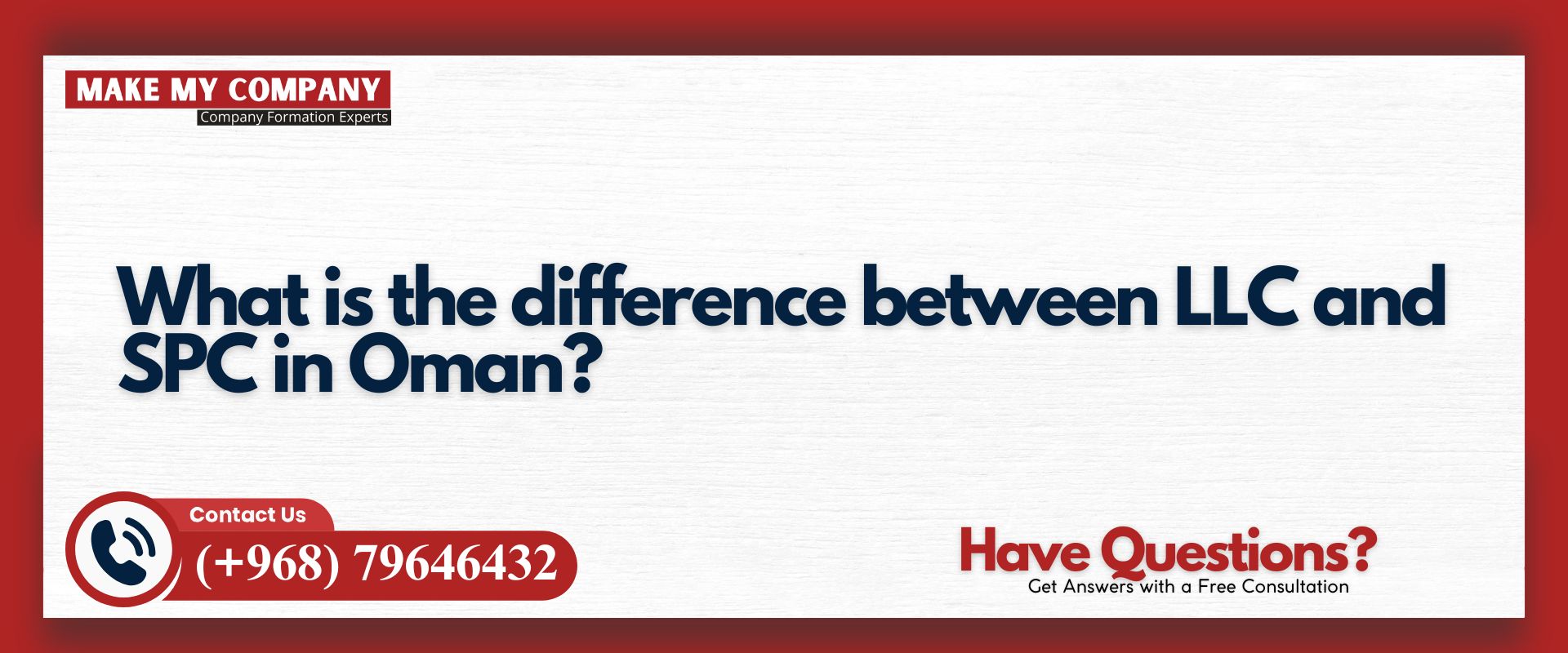Written by: Shuja Ahmad
Oman Business Structure Specialist
Last Updated: February, 2026
Information based on Ministry of Commerce, Industry and Investment Promotion (MOCIIP) current company law
LLC (Limited Liability Company) and SPC (Single Person Company) are the two most common business structures in Oman. While both provide limited liability protection, they differ significantly in ownership, capital requirements, management structure, and registration costs.
This guide explains the complete differences, helping entrepreneurs and investors choose the right company structure for 2026.
Quick Answer: LLC vs SPC Meaning in Oman
LLC Full Form: Limited Liability Company – Business structure allowing 2-50 shareholders with shared ownership and limited personal liability.
SPC Full Form: Single Person Company – Business structure allowing exactly ONE owner (100% ownership) with full control and limited liability.
Key Differences:
| Aspect | LLC | SPC |
|---|---|---|
| Owners | 2-50 shareholders | 1 owner only |
| Control | Shared management | Full owner control |
| Capital | Activity-dependent (often no fixed minimum 2026) | Lower requirements |
| Setup Cost | OMR 1,500-3,500 | OMR 1,000-2,000 |
| Foreign Ownership | 100% in approved sectors OR 70/30 | 100% in approved sectors |
| Best For | Partnerships, investors | Solo entrepreneurs |
What is SPC Company in Oman?
SPC Meaning in Company Registration
SPC = Single Person Company
An SPC is a legal business entity owned and operated by a single person, whether an Omani national, a GCC national, or an eligible expatriate. It combines the benefits of limited liability protection with full individual control.
Key Features:
- Single ownership: 100% owned by one person
- Limited liability: Personal assets protected
- Independent legal entity: Separate from owner
- Full control: All decisions made by sole owner
- Simpler management: No partner conflicts
Legal Basis: Established under the Oman Commercial Companies Law, regulated by the Ministry of Commerce, Industry and Investment Promotion (MOCIIP).
SPC Company Meaning: When It Makes Sense
Ideal for:
- Freelance consultants
- Independent professionals (IT, design, marketing)
- Small traders
- Service providers
- Solo entrepreneurs do not need partners
Advantages:
- Quick decision-making
- No partner disputes
- Lower setup costs
- Simpler compliance
- Full profit retention
What is an LLC Company in Oman?
LLC Meaning in the Oman Business Context
LLC = Limited Liability Company
An LLC is a business structure that requires at least 2 shareholders (up to 50) and divides ownership among the partners. Each shareholder’s liability is limited to their capital contribution.
Key Features:
- Multiple owners: 2-50 shareholders
- Shared ownership: Divided percentage stakes
- Limited liability: Each partner is protected
- Structured management: Board or managers
- Partnership agreements: Legal shareholder contracts
Legal Basis: Governed by the Oman Commercial Companies Law under MOCIIP regulation.
LLC Company in Oman: When It’s Required
Ideal for:
- Business partnerships
- Family businesses
- Investor-backed ventures
- Medium to large enterprises
- Businesses requiring capital pooling
- Joint ventures
Advantages:
- Multiple funding sources
- Shared risk
- Diverse expertise
- Scalability
- Investor confidence
LLC vs SPC: Complete Comparison
1. Ownership Structure
SPC:
- One owner: Exactly 1 shareholder
- 100% ownership: Complete control
- No partners: Cannot add shareholders
- Owner types: Omani, GCC, or eligible foreigners
LLC:
- Multiple owners: Minimum 2, maximum 50 shareholders
- Divided ownership: Percentage-based stakes
- Flexible partnerships: Can add/remove shareholders
- Mixed ownership: Omani + foreign combinations possible
2. Minimum Capital Requirements 2026
Important Update: Oman removed the fixed minimum capital requirement for most commercial activities as part of the 2024-2026 reforms.
SPC Capital:
- Most activities: No fixed minimum capital required
- Practical minimum: OMR 500-1,000 typical
- Professional services: OMR 1,000-2,000 recommended
- Regulated sectors: May require specific amounts
LLC Capital:
- Most activities: No fixed minimum capital required (2026 update)
- Practical minimum: OMR 2,000-5,000 typical
- Regulated sectors: Higher requirements apply
- Financial services: OMR 50,000-100,000+
- Healthcare: OMR 20,000-50,000
- Engineering: OMR 10,000-30,000
- Authority: MOCIIP determines sector-specific requirements
Key Point: While legal minimums have been removed for many activities, MOCIIP still expects businesses to maintain “adequate capital” to operate effectively.
3. Foreign Ownership Rules
SPC Foreign Ownership:
- 100% foreign ownership: Allowed in approved sectors
- Approved sectors: IT services, consulting, trading (specific categories), e-commerce, digital services
- Restrictions: Some strategic sectors require Omani ownership
- GCC nationals: Treated as Omani for ownership purposes
LLC Foreign Ownership:
- 100% foreign ownership: Allowed in many sectors (expanded 2024-2026)
- 70% foreign + 30% Omani: Required in certain sectors
- Approved 100% foreign sectors: Manufacturing
- Technology and IT
- Professional services
- E-commerce
- Tourism services
- Logistics
- Restricted sectors: Require Omani majority (banking, insurance, certain retail)
Authority: MOCIIP publishes an updated foreign ownership list annually.
4. Management and Decision-Making
SPC Management:
- Single manager: Owner manages directly
- Fast decisions: No approval processes
- No board: Owner IS the board
- Signing authority: Owner signs all contracts
- Autonomy: Complete operational control
LLC Management:
- Appointed managers: Can be shareholders or external
- Board of directors: Optional but common for larger LLCs
- Collective decisions: Based on the shareholder agreement
- Voting rights: Usually proportional to ownership percentage
- Manager authority: Defined in the company bylaws
5. Liability Protection
Both SPC and LLC provide limited liability protection:
SPC Liability:
- Owner’s personal assets protected
- Liability limited to capital invested in the company
- Business debts cannot claim personal property
- Owner shielded from company obligations
LLC Liability:
- Each shareholder’s personal assets are protected
- Liability limited to each shareholder’s capital contribution
- Partners not liable for other partners’ actions (generally)
- The company is responsible for its own debts
Exception: Fraud, illegal activities, or personal guarantees can pierce the limited liability shield in both structures.
6. Registration Process and Timeline
SPC Registration:
- Reserve trade name (MOCIIP): 1-3 days
- Prepare documents: 2-3 days
- Submit CR application: 5-7 days processing
- Municipality approval: 3-5 days
- Bank account: 3-5 days, Total: 2-3 weeks
LLC Registration:
- Reserve trade name: 1-3 days
- Draft partnership agreement (notarized): 3-5 days
- Prepare shareholder documents: 3-5 days
- Submit CR application: 7-10 days processing
- Municipality approval: 3-5 days
- Bank account (all partners): 5-7 days, Total: 3-4 weeks
7. Registration Costs Comparison
SPC Registration Costs:
| Item | Cost (OMR) |
|---|---|
| Trade name reservation | 50-100 |
| Commercial Registration | 200-400 |
| Municipality approval | 100-200 |
| Virtual office (annual) | 1,200-2,400 |
| PRO services (optional) | 300-800 |
| Total | 1,000-2,000 |
LLC Registration Costs:
| Item | Cost (OMR) |
|---|---|
| Trade name reservation | 50-100 |
| Commercial Registration | 250-500 |
| Partnership agreement notarization | 100-200 |
| Municipality approval | 150-300 |
| Virtual office (annual) | 1,200-2,400 |
| PRO services (optional) | 500-1,200 |
| Total | 1,500-3,500 |
Additional Costs (Both):
- Initial capital deposit (if required by sector)
- Business bank account: OMR 100-300
- First-year licenses/permits: Varies by activity
8. Annual Compliance and Renewal
SPC Annual Costs:
- CR renewal: OMR 200-400
- Municipality: OMR 100-200
- Accounting: OMR 1,200-2,400
- Tax filing: OMR 300-600 (if applicable)
- Total: OMR 1,800-3,600/year
LLC Annual Costs:
- CR renewal: OMR 250-500
- Municipality: OMR 150-300
- Accounting/auditing: OMR 2,400-6,000
- Shareholder meetings: OMR 200-500
- Tax filing: OMR 500-1,000 (if applicable)
- Total: OMR 3,500-8,300/year
SPC = Lower ongoing costs
9. Business Activities Allowed
- SPC Approved: Professional consulting, IT services, marketing, freelance services, e-commerce, small-scale trading, design services, business services
- SPC Restrictions: Large-scale manufacturing, banking, insurance, real estate development, major construction, healthcare facilities
- LLC Approved: All SPC activities PLUS manufacturing, construction, real estate development, healthcare, education, large trading, financial services, import/export
Authority: MOCIIP activity classification determines eligibility
10. Converting Between SPC and LLC
SPC to LLC (When Business Grows):
- Process: Owner decision → New LLC partnership agreement → Amend CR with MOCIIP → Add shareholders → Update bank/municipality
- Timeline: 3-4 weeks
- Cost: OMR 500-1,500
LLC to SPC (If Reducing to Single Shareholder):
- Buy out all other shareholders → Amend CR to SPC → Update registrations
- Less common but legally permitted
LLC SPC Meaning: Full Form Explanation
For international understanding:
LLC = Limited Liability Company
- Common worldwide business structure
- Known as “SARL” in Arabic (شركة ذات مسؤولية محدودة)
- Used in the USA, UK, GCC countries
- Protects owners from personal liability
SPC = Single Person Company
- Also called “One Person Company” (OPC)
- Known as “شركة شخص واحد” in Arabic
- Relatively newer structure (introduced ~2018 in Oman)
- Modern solution for solo entrepreneurs
SPC vs LLC: Which Should You Choose?
Choose SPC If:
- You’re starting solo – No partners or investors needed
- Want full control – Make all decisions independently
- Lower budget – Setup costs OMR 1,000-2,000
- Simpler operations – Freelance, consulting, small trading
- Fast setup – 2-3 weeks
- Lower compliance – Less paperwork annually
Example Businesses: Freelance IT consultant, marketing agency owner, small e-commerce seller, independent designer
Choose LLC If:
- Have business partners – 2+ people investing
- Need to raise capital – Multiple investors
- Larger operations – Manufacturing, contracting, complex business
- Shared expertise – Partners bring different skills
- Family business – Multiple family members involved
- Investor confidence – LLC structure is more recognized
Example Businesses: Restaurant with 3 partners, construction company, healthcare clinic, tech startup with investors
What is the Difference Between an LLC and an SPC? (Summary)
The main difference: Number of owners.
- SPC = 1 owner (you control everything)
- LLC = 2-50 owners (shared control and capital)
Other key differences:
- Setup cost: SPC cheaper (OMR 1,000-2,000 vs OMR 1,500-3,500)
- Compliance: SPC simpler
- Decision-making: SPC faster
- Capital raising: LLC is easier
- Liability: Both offer limited liability protection
- Activities: LLC broader scope
Sole Proprietor vs SPC vs LLC
- Sole Proprietorship: NOT a separate legal entity, owner personally liable, NO limited liability protection, personal assets at risk.
- SPC: Separate legal entity, limited liability protection, personal assets protected, sole ownership WITH protection.
- LLC: Multiple owners (2-50), separate legal entity, limited liability for all shareholders.
- Key: SPC gives sole ownership WITH liability protection. Sole proprietorship does NOT.
SPC Ownership and Foreign Investors
Can foreigners open an SPC in Oman?
Yes – foreigners can establish SPCs in approved sectors.
Requirements:
- Residence visa in Oman OR investor entry visa
- Approved business activity (check MOCIIP list)
- Capital sufficient for business operations
- Valid passport and documents
100% Foreign Ownership SPC Sectors:
- IT and software services
- Consulting and advisory
- E-commerce (certain categories)
- Digital marketing
- Design and creative services
- Professional training
Restricted Sectors:
- May require an Omani partner even for SPC
- Check MOCIIP regulations before starting
LLCFull Form in Oman: Legal Context
LLC in Oman legal framework:
Arabic: شركة ذات مسؤولية محدودة (Sharikah Dhat Mas’uliyyah Mahdudah)
English: Limited Liability Company
Abbreviation: LLC or L.L.C. or ش.ذ.م.م
Regulated by:
- Oman Commercial Companies Law
- Ministry of Commerce, Industry and Investment Promotion (MOCIIP)
- Royal Decrees on foreign investment
International Recognition:
- The LLC structure is recognized globally
- Similar to GmbH (Germany), Ltd (UK), SARL (France)
- Facilitates international business operations
SPC Company Type in MOCIIP Classification
Official Classification:
- Category: Single Person Company (SPC)
- Legal Form: Limited liability entity
- Registration Authority: MOCIIP
- License Type: Commercial Registration (CR)
- Company Law: Article [specific] of the Commercial Companies Law
CR Certificate Shows:
- Company legal name
- “Single Person Company” designation
- Owner name
- Business activities
- Registration number
- Capital amount
Frequently Asked Questions
What is the full form of SPC in company registration?
SPC = Single Person Company. It’s a business structure allowing one person to own and operate a company with limited liability protection. In Arabic: شركة شخص واحد (Sharikah Shakhs Wahid).
What does LLC mean in Oman?
LLC = Limited Liability Company (شركة ذات مسؤولية محدودة). It’s a business structure with 2-50 shareholders where each owner’s liability is limited to their capital contribution. Regulated by MOCIIP.
What is the minimum capital for SPC in Oman in 2026?
Most activities have no fixed minimum capital requirement (updated 2024-2026). Practical minimum: OMR 500-2,000 depending on business type. Regulated sectors (finance and healthcare) may require higher capital requirements. Verify with MOCIIP for your specific activity.
Can one person own an LLC in Oman?
No. LLC requires a minimum of 2 shareholders. If you want 100% sole ownership, you must register an SPC (Single Person Company) instead. If LLC loses shareholders and only one remains, it must convert to SPC or add a new shareholder.
What is the difference between LLC and SPC Oman?
Main difference: SPC = 1 owner, LLC = 2-50 owners. SPC provides full control, faster decisions, and lower costs (OMR: 1,000-2,000 setup). LLCs allow partnerships, capital pooling, and higher setup costs (OMR 1,500-3,500). Both offer limited liability protection.
How much does it cost to register SPC in Oman?
OMR 1,000-2,000 total, including: trade name (OMR 50-100), Commercial Registration (OMR 200-400), municipality (OMR 100-200), virtual office first year (OMR 1,200-2,400), optional PRO services (OMR 300-800).
Can foreigners open an SPC in Oman?
Yes. Foreigners can establish SPC with 100% ownership in approved sectors (IT, consulting, e-commerce, professional services). Requires residence/investor visa, approved activity, and adequate capital. Some sectors are restricted. Verify with MOCIIP.
What is SPC vs LLC for a small business?
SPC better for solo entrepreneurs: 1 owner, full control, lower costs (OMR 1,000-2,000), simpler compliance. LLC better for partnerships: 2+ owners, shared capital, higher costs (OMR 1,500-3,500), structured management. Both protect personal assets.
Conclusion
The differences between LLCs and SPCs in Oman come down to ownership structure, control, and business needs. SPC (Single Person Company) suits solo entrepreneurs who want full control with limited liability protection, while LLC (Limited Liability Company) serves partnerships and investor-backed ventures that require multiple shareholders.
For 2026, both structures benefit from Oman’s updated company law, removing fixed minimum capital requirements for most activities, making business registration more accessible. Setup costs range from OMR 1,000-2,000 for SPC and OMR 1,500-3,500 for LLC, with SPCs offering simpler compliance and faster decision-making.
Foreign investors can establish both structures with 100% ownership in approved sectors under MOCIIP regulations. Choose SPC for solo operations with lower costs and greater autonomy, or LLC for partnerships that require shared capital, diverse expertise, and structured governance.
Understanding these differences before registration saves time and money and ensures the right foundation for your business’s growth in Oman’s evolving commercial landscape.
Legal Disclaimer:
This guide is informational, based on February 2026 MOCIIP regulations and the Oman Commercial Companies Law. Capital requirements and foreign ownership rules change periodically. Always verify current requirements through official MOCIIP channels or authorized business consultants before registration.
About the Author:
Shuja Ahmad specializes in Oman company formation, business structure selection, and MOCIIP registration procedures, helping entrepreneurs navigate LLC and SPC registration successfully.
For current MOCIIP registration requirements and guidance on company structure, visit the official Invest Easy portal (invest.oman.om) or consult authorized business setup service providers Like MakeMyCompany.









